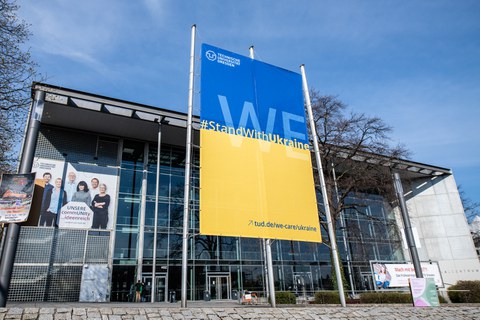Jul 26, 2022
TU Dresden erhält Förderung für Projekte und Wissenschaftler:innen in und aus der Ukraine
Despite budget cuts announced by the German Academic Exchange Service (DAAD) and the Federal Foreign Office (AA) for international research cooperation and grants for this year and the years to come, TU Dresden has managed to secure funding from the “Ukraine digital” program and for the support of researchers who have fled from the war in Ukraine. Five fellowships from the Alexander von Humboldt Foundation’s Philipp Schwartz Initiative will now provide the necessary financial security to the successful candidates to conduct research at TU Dresden for 18 months.
Ukraine digital: TUD builds bridges
Due to the Russian-led war of aggression, universities in eastern Ukraine in particular have been forced to transfer teaching to a virtual space. The interdisciplinary project “TUD builds bridges” (TUD baut Brücken) seeks to develop the appropriate courses as well as methods and tools needed for this virtual space together with partner universities in Ukraine. Researchers who have fled the war in Ukraine for Germany can bring their skills and knowledge to the project as “bridge-builders.”
The project has been initiated by the International Institute (IHI) Zittau in cooperation with the Institute of Slavic Studies, the Chair of Business Information Systems and the Faculty of Computer Science. The Institutes and Chairs at TU Dresden are working closely together with Kharkiv Polytechnic Institute, the Odessa National Music Academy named after A.V. Nezhdanova , the National Technical University of Ukraine “Igor Sikorsky Kyiv Polytechnic Institute” and West Ukrainian National University (WUNU) in Ternopil.
“TU Dresden and our partner universities in this project share extensive experience in digital teaching, which we will continue to develop in the coming months and plan to integrate into joint digital teaching projects,” explains Prof. Thorsten Claus, Director of IHI Zittau and Chair of Production Economy and Information Technology. “The participating institutes contribute their own experiences to be shared with the other project partners for reflection. The Center for Interdisciplinary Learning and Teaching (ZiLL) and the TU Dresden International Campus will also provide their expertise during the implementation of international teaching on an international scale.”
In addition to improving digital teaching methods and tools, the project aims at closer networking and, in the best-case scenario, to develop a common international and digital degree program.
Five fellowships from the Philipp Schwartz Initiative
With the support of their mentors at TU Dresden, eleven researchers in total applied for a Philipp Schwartz Initiative (PSI) fellowship in spring 2022. Five of them have ultimately been awarded an 18-month fellowship. Both the numbers of applicants and grant recipients are record-breaking.
“Never before has TU Dresden seen such abundant funding,” says Katharina Schmitt (Head of Task Force Ukraine), who coordinates aid at TU Dresden for researchers and students seeking refuge.
Three researchers also received an emergency fund for six months, intended to help them apply to the next round of funding from the Philipp Schwartz Initiative or other grant programs.
“We were able to find solutions for some of the remaining researchers as well,” adds Katharina Schmitt. One researcher will receive aid from the “Ukraine digital” project. Another will benefit from support from the Volkswagen Foundation through March 2023.
“Only one researcher still hasn’t received financial aid. We are working on getting him the help he needs,” she explains.
The sponsored researchers can now continue their work at seven of TU Dresden’s institutions, where they will receive assistance from their mentors. These are the Institutes of English and American Studies, Landscape Architecture, Concrete Structures, Slavic Studies, Textile Machinery and High Performance Material Technology (ITM), and Railway Systems and Public Transport as well as OncoRay (radiation therapy). Many of these researchers have fled from the war with their families, ending up here in Germany, where they will also receive integration support from TU Dresden, for instance in learning German.
Contact:
Katharina Schmitt
Team Leader Task Force Ukraine
TU Dresden – International Campus
Prof. Thorsten Claus
Director IHI Zittau, Project Coordinator
+49 3583 6124001
Aid for Ukrainian refugees at TU Dresden
At the start of the war in Ukraine, TU Dresden formed a group for linking and coordinating all related initiatives and support services for Ukraine at TUD. An overview of these services is available here: tu-dresden.de/we-care/ukraine. This summer semester, over 100 students seeking refuge began taking German courses here. Moreover, the International Office offers advising services and study options to facilitate the continuation or start of these individuals’ studies in Dresden.
About the Philipp Schwartz Initiative
The Philipp Schwartz Initiative was brought to life by the Alexander von Humboldt Foundation and the Federal Foreign Office. It enables universities as well as universities of applied sciences and non-university research institutions in Germany to award fellowships for research stays to researchers under threat in their country of origin.
About the DAAD program “Ukraine digital: Ensuring academic success in times of crisis”
The program “Ukraine digital: Ensuring academic success in times of crisis” supports Ukrainian universities in maintaining, implementing and offering digital teaching to guarantee students in Ukraine the prospect of graduation despite limitations introduced by the war. At the same time, Ukrainian students seeking refuge at German universities are provided an online platform for continuing and completing their studies in Ukraine.
The active involvement of Ukrainian researchers and lecturers located in Germany or other European countries offers them the opportunity to resume giving courses at their home institution online from abroad and in their national language.
This program creates and secures permanent connections that are crucial for rebuilding and for future German-Ukrainian university cooperation.

